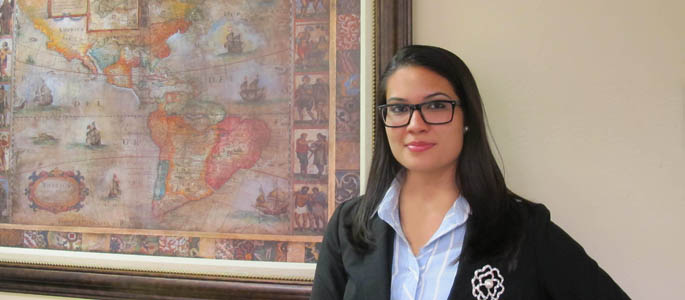Humanitarian Work Inspires International Student to Pursue Master's in Psychology Wednesday, October 22, 2014

Meet Shari Boddin
"This program is especially effective because it's taught by genuine professors who are exemplary role models and practice what they are teaching their students."
-- Shari Boddin
Related links
- M.A. in clinical-community psychology
- Graduate admission
- International students
- Apply online
Graduate program: Master of Arts in Clinical-Community Psychology
Job title: IELTS invigilator/TOEFL administrator and administrative assistant
Employer: ELS Educational Services Center, Pittsburgh
Degree earned: B.A. in psychology, Slippery Rock University, 2012
Hometown: Colombo, Sri Lanka/ Cologne, Germany
High school: The British School in Colombo, Sri Lanka
Currently living in: Pittsburgh, Pa.
Expected graduation: May 2015
Hobbies/interests: Volunteer work, especially with children, and engaging in a variety of sporting activities
What led you to choosing Point Park's clinical-community psychology grad program?
A majority of the experience I have, both voluntary and paid, is related to working with children, their families and communities as a whole. This is the reason why Point Park's new Master of Arts degree in clinical-community psychology interested me.
Who inspired you to pursue a career in psychology?
My parents played a significant role in my decision to pursue a career in psychology, albeit indirectly. I was brought up in a household in which helping other people was a highly emphasized value. My parents did a great deal of community work ranging from providing food for the poor to raising money and engaging in community work for victims of the devastating tsunami which ravaged coastal areas in several parts of Southeast Asia in December 2004.
During that time, I joined my parents on several trips around the island of Sri Lanka helping people affected by the tsunami. Even though I was just a young teenager at the time, the plight and suffering of those people really struck me. That experience was the first of many which led me into a career devoted to helping people. My specific interest in psychology resulted from classes I took and research I did which led me to pursue an undergraduate psychology degree in the United States.
Tell us about the psychology-related work experiences you've had so far.
I started volunteering and doing community work during high school which ranged from working in an orphanage to teaching English classes for children living in shantytowns near my high school in Sri Lanka. I also completed an apprenticeship working with psychiatrists at the National Institute of Mental Health in Sri Lanka.
My paid experiences in the field were in the United States and include being a direct care worker at a children's psychiatric hospital and a service coordinator for a housing project that provided support services for adults with mental health disorders.
Describe the teaching style of the professors in the clinical-community psychology M.A. program.
What I value and appreciate the most is that all of the professors in this program provide students with a very realistic view of the field while equipping us with the educational tools to be successful in our careers and effectively help people. In short, the professors inform us of the positive and negative aspects of the field and through lecture materials, encourage students to strive to make a difference, regardless of how challenging this field can get.
What are your career goals and how do you think the M.A. program will help you reach them?
I would like to work for a nonprofit organization for two main reasons. The first is because nonprofit organizations are based all over the world and I would like to maintain my cross-cultural background. Furthermore, there are so many issues to tackle around the world, and while it is impossible for me to work on every single one of them, I would like to keep my options open. Second, while one cannot generalize and it is not the case for every single organization, I have found that nonprofits seem to have their priorities in check, in that helping people trumps other agendas such as monetary profits.
I believe Point Park's M.A. in clinical-community psychology degree will enable me to reach my career goals due to the program's emphasis on community aspects of mental health, which is often neglected in the mental health field. In addition, this program is especially effective because it's taught by genuine professors who are exemplary role models and practice what they are teaching their students. I intend to take my experiences from this University and utilize my education to help and work with communities worldwide.
More About: international, M.A. in clinical-community psychology

